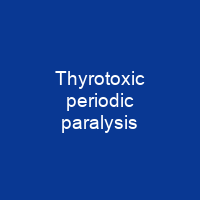Thyrotoxic periodic paralysis is a condition featuring attacks of muscle weakness in the presence of hyperthyroidism. The condition may be life-threatening if weakness of the breathing muscles leads to respiratory failure, or if the low potassium levels lead to cardiac arrhythmias. It occurs predominantly in males of Chinese, Japanese, Vietnamese, Filipino, and Korean descent.
About Thyrotoxic periodic paralysis in brief

The muscle weakness and increased risk of irregular heart beat in TPP result from reduced potassium in the bloodstream. Potassium is not in fact lost from the body, but increased from increased metabolic activity. In other types of potassium derangement, the balance is usually disturbed with alkalosis. In TPP, the muscle weakness is usually symmetrical; the limb muscles closer to the trunk are predominantly affected, and weakness tends to start in the legs and spread to the arms. There may be symptoms of thyroid overactivity, such as weight loss, a fast heart rate, tremor, and perspiration; but such symptoms occur in only half of all cases. Thyroid disease may also cause muscle weakness, but this is constant rather than episodic.
You want to know more about Thyrotoxic periodic paralysis?
This page is based on the article Thyrotoxic periodic paralysis published in Wikipedia (as of Nov. 03, 2020) and was automatically summarized using artificial intelligence.







